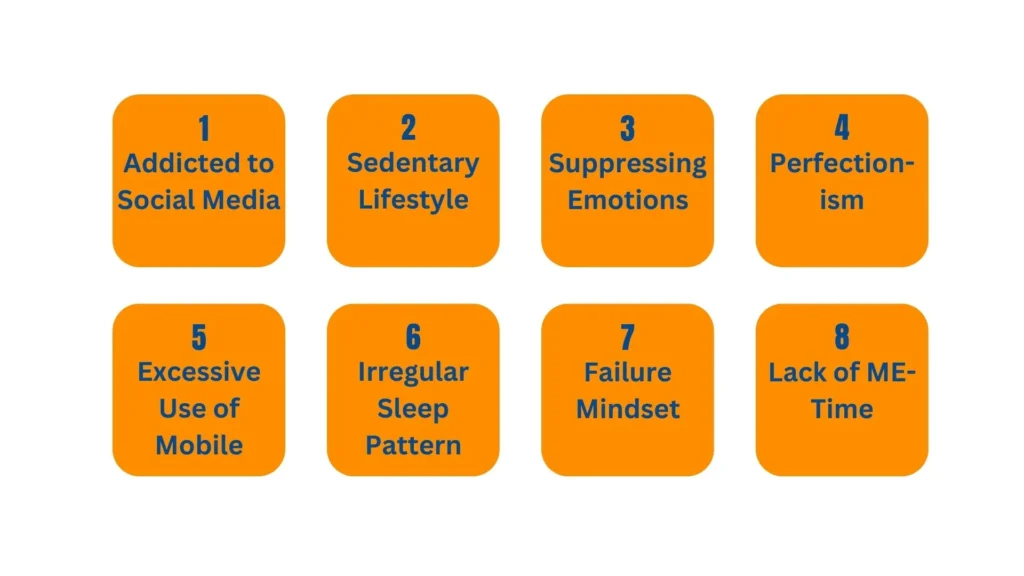A Brazilian novelist, Paulo Coelho, says, “All stress, anxiety, depression, is caused when we ignore who we are, and start living to please others.” It is because we adopt bad habits for mental health.
You might be wondering what the link is between these two. How the way you are living is affecting your mental health? Wait!
The blog will explore how the worst habits for your mental habits are linked to your lifestyle, along with some unhealthy mental health examples.
Table of Contents
What are Bad Mental Habits?
Bad mental habits refer to persistent patterns of negative thinking, self-criticism, and pessimism that erode your mental health and well-being. These patterns sometimes reflect perfectionism, low self-esteem, and other emotional damage.
Besides other bad habits, these unhealthy mental habits result in self-sabotaging, negative thoughts, and harmful coping mechanisms.
Therefore, it is essential to identify the triggers and find alternative constructive methods to maintain positive mental health and well-being. You can stop it permanently, like other bad habits.
Top 8 Bad Habits for Mental Health
We are too busy completing our tasks or projects, caring for our physical health, and relationships with friends and family. But we do not realize that what we do habitually has harmful effects on our mental health.
Therefore, it is crucial to identify these bad habits for mental health. Let’s discuss the following list of bad mental habits:

1. Addicted to Social Media
Social media is a means to get connected to your friends and surroundings. Do social media always serve the purpose of building connections and happiness? No!
We are all addicted to social media apps like Instagram, Facebook, X, Threads, and many more. Have you ever considered what these platforms are bringing to us? Depression and anxiety!
Why? Because what we see on these platforms is not the real world. It creates a sense of deficiency in us. We started to feel minor, and our desires grew by leaps and bounds. We are attracted to those beautiful filtered faces and question our physical features.
So, this addiction to social media is considered a bad habit for mental health as it causes decreased productivity, isolation, impaired sleep, attention-seeking behavior, self-criticism, and FOMO (fear of missing out).
2. Sedentary Lifestyle and Lack of Exercise
Are you a couch potato? Being a couch potato sounds fun, spending all day lying on your bed while having snacks, watching movies, or even reading novels.
However, it is one of the worst habits for your mental and physical health. The lack of physical exercise results in higher risks of bad mental health. A person who is less active and does less exercise suffers from higher depression, and vice versa.
Also, specific exercises that affect mental health include irregular exercising, exhaustion, and doing only one form of exercise. So, a sedentary lifestyle and lack of exercise are other bad mental habits.
Get up and make exercise your habit. A chemical, ‘Endorphins,’ is released due to daily physical movement and exercise. It may ease your depression, lower stress, alleviate pain, and make you feel pleasure.
3. Suppressing Emotions
You have heard the proverb, ‘Excess of everything is bad.’ In this scenario, excessively holding on to your emotions is detrimental to your mental health.
We all need someone who can listen to our chatter, emotions, fears, and passions without judging. But sometimes, we are so overwhelmed by our feelings that we suppress them. The suppression may result from societal expectations, fear of judgment, or a lack of understanding.
For instance, you got angry over something. Instead of showing your anger, you internalize your anger and put a smile on your face. Now, you are a ticking bomb that can burst at any time.
This suppression of your emotions is a bad habit for mental health. It results in unhealthy mental health, such as anxiety, depression, increased stress, impaired decision-making, and interpersonal difficulties.
4. Perfectionism
Striving for perfection in your task is a healthy habit. But unnecessarily setting high, unattainable goals for your tasks proves destructive for your mental health.
According to psychology, perfectionism can be positive and negative.
| Positive Perfectionism | Negative Perfectionism |
|---|---|
| It helps you do your best | It holds you by setting high standards |
| Habits include setting realistic goals | Habits include setting unrealistic and unattainable goals |
| It allows letting go of failure | It is preoccupied with failure and disapproval |
| It seeks flaws as opportunities to grow | It seeks flaws as evidence of unworthiness |
| It keeps stress and anxiety within health boundaries | It results in distress, uncertainty, fear, impaired mental health, and low self-esteem |
As a result, perfectionism is a bad mental health habit when negative.
5. Excessive Use of Mobile
The world is progressing, and so is technology. Decades ago, people used to send each other letters or mail through pigeons, isn’t that lovely? But what happened with the advances in technology?
Now, the world is just a click away. We can order lunch, book a ride, call a friend, have a face time, etc. But besides all these luxuries, the technology brought a bunch of unhealthy mental health problems.
This excessive use of smartphones, or smartphone addiction, is problematic as it is a bad mental habit. People may think they are safe because they do not have social media apps installed on their cell phones, but they aren’t.
People compulsively use their mobile phones to check notifications for fear of being left out or reading educational documents. It results in depression, anxiety, chronic stress, low self-esteem, reduced productivity, and impaired cognitive functions.
6. Irregular Sleep Pattern
Before deciding between staying awake till late at night, Wait!
Let’s see how your decisions will impact you.
Sleep is essential for physical and mental health because it allows your body and mind to rest. On the other hand, there is a condition in which a required or sufficient amount of sleep is not obtained, known as sleep deprivation.
Irregular sleep patterns are bad habits for mental health. If you sleep more than the required amount, you will feel lazy and reduce productivity. Whereas, if you sleep less, you will feel irritated, and your productivity will be affected again.
Patients with mental health issues like depression, psychological stress, and anxiety also have insomnia. Depression and anxiety increase when your sleep patterns get disturbed.
So, maintain a good sleep habit to save yourself from these unhealthy mental health issues.
7. Failure Mindset
As Thomas Edison said, “Many of life’s failures are people who did not realize how close they were to success when they gave up.”
Everyone has negative thoughts now and then, and also occasional feelings of failing out. It does not have any harmful effects on mental health. However, fostering these negative thoughts and low self-esteem leads to unhealthy mental health.
Failing your task is not defeatist. It is a step towards success. However, having a failure mindset is problematic. The ugly thoughts that your life is miserable and bleak and you cannot accomplish your goals prevent you from excelling in your tasks.
You will not succeed unless you have this fear of failure. It proves a bad habit for mental health as it leads to negative self-talk, perfectionism, increased stress and anxiety, depression, avoidance behavior, and self-isolation.
8. Lack of ME-TIME
Me-time is a time for you. A time honestly spent with yourself by making a conscious effort to recharge your battery. It refers to being present with yourself, bodily and mentally.
In typical middle-class households, people can never find these peaceful moments. Funny! In these families, they spent more time in washrooms, thinking it was me-time. But definitely, they are mistaken.
Lack of me-time is a bad habit for your mental health. Depression and anxiety creep in if you are not able to find time for yourself.
For instance, you may feel burnout due to a lack of personal time, resulting in emotional exhaustion and poor performance. Similarly, engaging in external responsibilities without taking care of me-time causes chronic stress and impairs decision-making.
3 Unhealthy Mental Health Examples
Mental health illness or unhealthy mental health means a wide range of mental health disorders. It affects the mood, thinking, and behavior of individuals.
Bad mental habits lead to various mental problems. Examples of unhealthy mental health are many, including stress, anxiety, depression, ADHD, eating disorders, mood disorders, schizophrenia, etc.
The most common three unhealthy mental health examples are:
| Unhealthy Mental Health | Definition | Causes | Effects |
|---|---|---|---|
| Anxiety Disorders | It refers to uncontrollable feelings of fear and worry. It is related to behavioral disturbance. | Exhaustion, work pressure, loss of a loved one, lack of me-time, failure mindset | Dizziness, pins and needles, faster breathing, restlessness, headaches, churning feelings in the stomach. |
| Depression | Depression refers to persistent feelings of hopelessness, sadness, and lack of interest. | All bad habits for mental health lead to depression | Pain, headache, digestive problems, cramps, unplanned weight changes |
| Panic Disorders | People with panic disorders face regular panic attacks, which involve a sense of imminent disaster or sudden overwhelming terror. | Anxiety disorders lead to panic attacks. | Chest or stomach hurts, heart beats faster, feelings of terror, dizziness, breathlessness. |
How can Bad Eating Habits Affect You Mentally?
Eating disorders refer to irregular eating patterns and severe distress. Eating disorders such as anorexia nervosa, i.e., less intake of food or not eating at all, and bulimia nervosa, i.e., consuming large amounts of food in a short period, involve body shape and weight concerns, as well as abnormal eating.
Bad eating habits affect you mentally by developing disturbing thoughts and emotions. In severe conditions, it is a behavioral condition that affects social, physical, and psychological functions.
It also develops negative self-image, anxiety, depression, and irritability. Moreover, sadness and anger also lead to eating disorders.
Conclusion
In a nutshell, the eight bad habits for mental health include addiction to social media, a sedentary lifestyle, excessive use of smartphones, suppressing emotions, perfectionism, failure mindset, irregular sleep patterns, and lack of me-time.
Moreover, specific unhealthy mental health examples are depression, anxiety disorders, eating disorders, mood disorders, and panic disorders. These habits are the worst enemies of your mental health. With time and determination, you can break these habits.
Please share it with your circle to let them know about these detrimental bad habits for mental health. As Knowledge increases by sharing!
FAQs
What Causes Mental Health Problems?
The causes of mental health can vary; some of these are:
1. Drug use
2. Childhood abuse
3. Isolation
4. Family conflicts
5. Genetics
6. Social factors, poverty
7. Trauma
What is Mood Disorder?
It is a category of mental health illness that primarily affects your emotional state, just like bad habits for mental health. This disorder involves prolonged sadness, melancholy, joy, and other emotions that affect daily functioning. Professionals use this term to describe all types of depression and bipolar disorders.
The causes are stressful life events or imbalanced brain chemicals. The effects can vary from decreased energy or fatigue to pain, cramps, or digestive problems.




